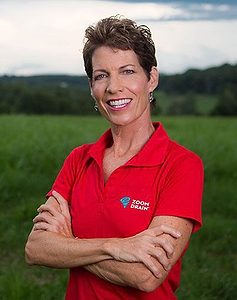The Orbiting Influencer
Making the right decision involves boldness, decisiveness and good counsel.

An ultramarathon is any running event longer than the 26.2-mile traditional distance. I ran my first ultra in December 2016, a 50K/31-mile trail run. Now, I am training for a 12-hour running event, coming up in September. I’m discovering that as I stretch my physical limits and mental capacity, I can do so much more than I ever thought possible. That confidence is spilling into my personal and business relationships, too. I see things from a longer, broader perspective. The benefits have been 10 times what I expected when I took the risk and committed to the ultra.
However, when I first shared my goal — to run a 31 miler — the responses were usually less than supportive:
“At your age?”
“You’ll ruin your knees with all that pounding.”
“Isn’t that a little … obsessive?”
“It’s a lot healthier to exercise moderately.”
Even my chiropractor gave me an eye roll. The thing is, I wanted to do one. I want to do another even more extreme event. I’m committed to helping dreams come true, including my own.
Note that my friends and associates probably thought they were being helpful. While it’s often useful to seek advice and counsel from others, it’s important to stay true to what you really want.
Is it risky to do long races? Sure. Yet, every day you are in business (or alive?) you are juggling risk versus reward decisions. Quantum leaps in business can only happen if you are willing to choose your destination, jump into your rocketship and go.
“A ship in harbor is safe — but that is not what ships are built for.” ~John A. Shedd
Over the years, I have represented several industry trade associations and a couple of franchises, as a sales person. On occasion, I have watched owners value the counsel of others over their own goals and dreams. They’ve said, “No,” when they could’ve said what they perhaps really wanted to say, “YES!” Sigh. This situation always leads me to question and seek to improve my sales and communications skills. If I ultimately buy from (or are swayed by) people I love and trust, how do I point out that the person I love and trust (attorney, CPA, brother-in-law) may not know the best decision for me in this situation?
This frustration is what prompted me to write this column.
Sweet spot or stuck point
Opportunities come and go, like windows open and close. If you miss one, there may well be another. However, there is a limited amount of time that you may be interested in, and capable of, seizing a life-changing, potentially wealth-building opportunity. I’ve noticed that there is a sweet spot when you are most likely to make a breakaway decision about your company. The sweet spot is when you realize your current path isn’t leading where you want to go, or to all that you want to be. Yet you still have the “fizz,” the energy, health and heart to go on the adventure. It takes a plan, a rocketship and lots of fuel to seize a bold opportunity.
Now, if your goal is to be a rockin’, one-person shop or a nicely niched small company, go for it! Never let me, or anyone, tell you what you want to be or do or have. However, if you really, really want to create a bigger empire, I suggest you take action before your sweet spot becomes a stuck point.
You may be considering an exciting opportunity. Perhaps you are exploring an acquisition, partnership, franchise, ESOP or options for transitioning your company. You’ll be developing relationships with new people, potential partners and business experts. It can be overwhelming, and even a bit scary.
The orbiting influencers
You need a good attorney, and sometimes more than one, as they specialize. An attorney’s job is to point out the risks and the potential holes in the road. Their job is to keep you safe, which we know is never entirely possible. Often, an attorney will discourage you from an opportunity that looks different, or seems complicated, even if the upsides far outweigh the risk. The easiest answer is, “No!” Also, business owners tend to bring the attorney to the table too early. It’s better to flesh out the basic deal points before you engage your legal team.
Your accountant is responsible for helping you stay in compliance, out of the pokey and for crafting a sound tax strategy. I’ve met a ton of accountants, and a few of them are savvy business people, but that is not required to serve their primary responsibilities. Consider their counsel appropriately.
Orbiting advisors can help with understanding the details that need to be nailed down for you to be comfortable with the agreement. However, the terms of the agreement are never so good as to make up for lack of character in the participants of the agreement. As you make your decisions, choose people over paper.
Are you are making a decision that will impact the person to whom you are intending to transition the company? A family member or a key employee? Certainly, meet with him or her to discuss your goals and dreams and find out about theirs. Consider the opportunity from each perspective. Note, if the transition is years away, don’t put your business on “hold” as it could “mold.”
A leader decides
At the head of every organization is the one responsible for leading it. Good leaders assume that responsibility and great leaders engage with their team, and their counselors, for ideas and input.
Great leaders also seek their own counsel, spend time in quiet reflection, allow for inspiration and ask and listen for the answers to the questions: “What do I want?” “What do my team members want?” “Where are we going with this business?” and “Why?”
Do consider the input of your trusted advisors. Understand that they may not understand the opportunity, or your business and personal goals. You may choose to help them get up to speed. However, as the owner of your company, the decision maker is you. The captain steers the ship.
Most people choose the illusionary safe route. Often at the well-intentioned prodding of an orbiting influencer. Over the years, I have met a few who have made big, seemingly scary leaps and delighted in their stellar success stories. Our industry could use more of them.
Sometimes, they make the leap, then frantically doggy paddle back to the launch point. They fail to fully commit and keep looking for the undo button. Note that there are very few decisions that can’t be modified or amended or improved as you progress. Every epic journey has twists and turns. There is no guarantee, but the adventure may be well worth it. Possibly, there is wealth to be created. Even better, is what you will become in the attempt.
At least once a month, I get a call from someone well past the sweet spot who wants to cash out of their company. It’s heartbreaking to discover that after all their work and devotion to the trade, they have literally nothing — no retirement, no savings and very few assets. Fear, or an orbiting influencer, kept a worthy captain from leaving safe harbor.
Here’s what I know for sure: We are too old to waste time. When it comes to running, and business, I am committed to surrounding myself with people who think big and believe in me. I’ll seek input from smart counselors, and I will pursue my dreams, even if they scare me a bit. Shouldn’t a dream be a little scary? Shouldn’t it be difficult at times? Isn’t that what makes it a worthy adventure?
When it comes to extreme running, I have turned down the voices that tell me it’s not a good idea. I fill my head, and my iPhone, with podcasts and books by people who have done what I want to do, and lots more. I talk about what I want, not what I don’t want. If I get injured, I look for methods to recover, not for evidence to quit.
That’s my approach to business, too.
Blast off!





